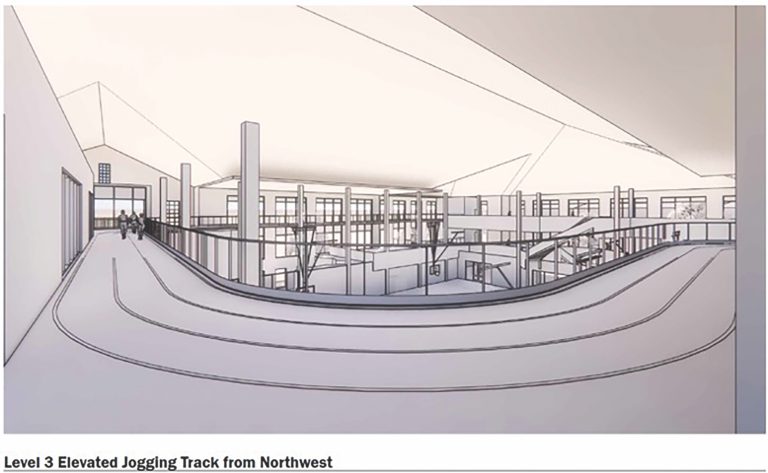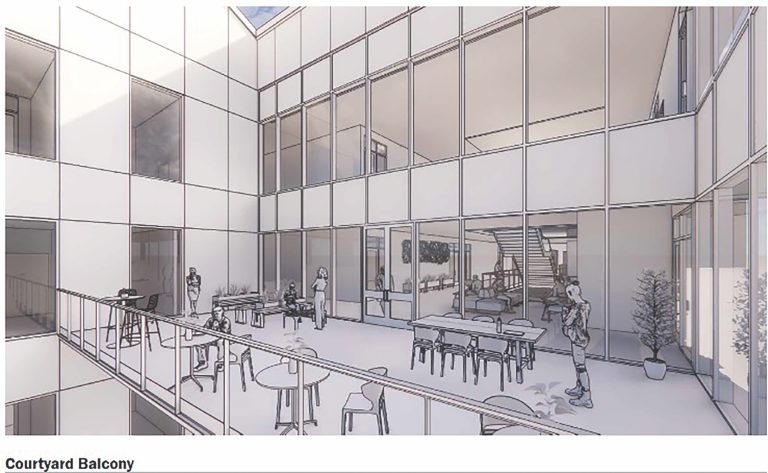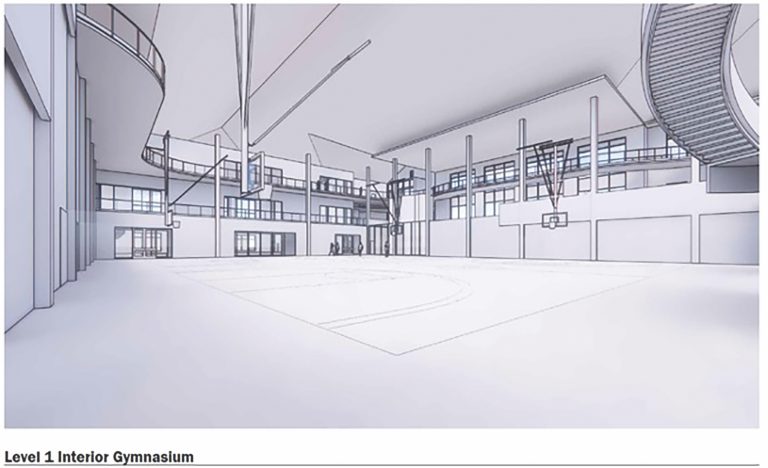The 135,000-square-foot center will be a hub for health and well-being within the university’s Innovation Quad and is scheduled to open in summer 2026.
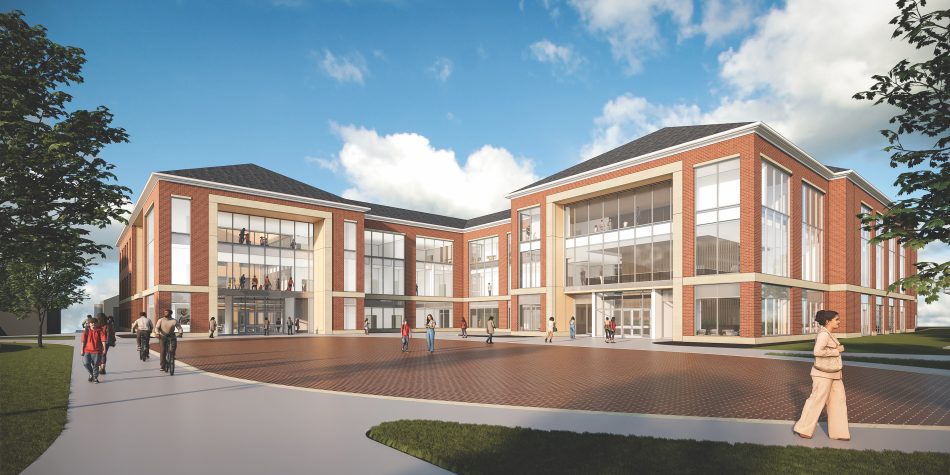
As a reflection of its commitment to supporting the holistic health of all students, faculty and staff, Elon University has formally announced plans to build a 135,000-square-foot facility within its Innovation Quad to support the broad spectrum of dimensions in its HealthEU initiative.
The HealthEU Center will become the second-largest building on campus behind Schar Center and will be a hub that combines academics with recreation, health and well-being offerings in support of the holistic growth of members of the university community. The design of the building prioritizes collaboration, connection and innovation.
“We understand that health and well-being are critical to the success not just of our students but also our faculty and staff,” President Connie Ledoux Book said. “This multifaceted facility will provide a wide range of support to our community and offer opportunities to connect with each other and with resources that support their growth and development.”
The three-story building will be built south of the Colonnades Neighborhood within the Innovation Quad, an area of campus that now includes Sankey Hall, Founders Hall and Innovation Hall. The multifunctional facility is rooted in the six dimensions of wellness through the HealthEU initiative — community, emotional, financial, physical, purpose and social.
The HealthEU Center will include offices and space for academic departments including Exercise Science, Education & Wellness and other faculty focused on health and wellness. Labs and spaces for interdisciplinary research will be included as will rooms designed for one-on-one and group fitness assessments, personal training, health and nutrition coaching, and financial literacy.
An expanded Counseling Services center will relocate to the new building in support of individual and group therapy with offerings including workshops and outreach programs. A HealthEU vending space will provide on-the-go wholesome options and a demonstration kitchen will support nutrition education efforts as a new resource for Elon’s Food Studies minor, which provides students the opportunity to study and synthesize concepts around food production, distribution and consumption from multiple perspectives. The demonstration kitchen will also serve as a venue for co-curricular health and nutrition coaching to promote healthy eating habits for students, faculty and staff.
The HealthEU Center will offer new campus recreation and fitness facilities including:
- A gymnasium with team and individual recreation spaces.
- An aquatics center with a collegiate competition-sized pool.
- Fitness, weight training and exercise space for groups and individuals.
- An indoor track.
- A climbing center with climbing and bouldering walls.
- Outdoor fitness center.
A physical therapy and athletic training clinic will be included as well as studios for individual and group meditation, mindfulness and yoga. Space will also be provided to support employee wellness programs.
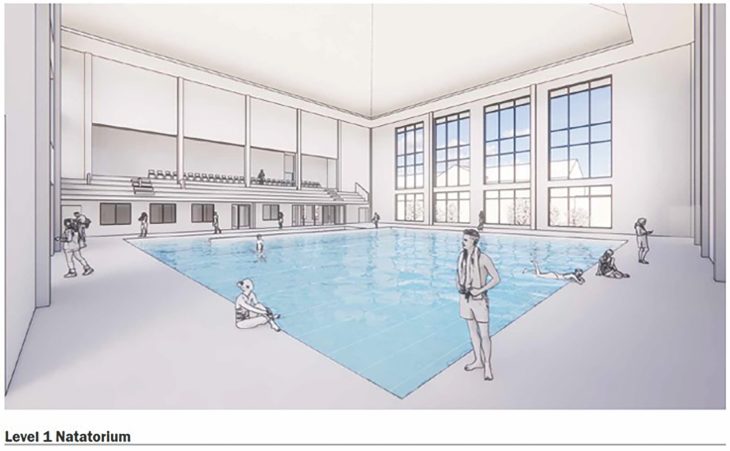
Early conceptual renderings of the building depict architecture that complements Elon’s traditional collegiate aesthetic with a modern flourish, boasting swaths of large windows to create an open, welcoming space and showcase the activity within the building from the exterior. An expansive entry plaza, outdoor fitness areas and ample green space surround the building, while inside areas for fitness and athletics, nutrition, mental well-being, research, classrooms and offices can be found throughout the three floors. A significant portion of the second and third floors are open, so visitors can easily view the activity below at the pool, gymnasium courts and climbing areas.
Elon has set a $25 million fundraising goal to help make the HealthEU Center a reality. To date, donors have contributed more than $6.5 million to the project, said Jim Piatt, senior vice president for university advancement and external affairs. Among the generous donors to the project are alumni Mark ’98 and Kim Tyson ’99, of Monroe, North Carolina, who made a $3 million gift to name the counseling center in the building.
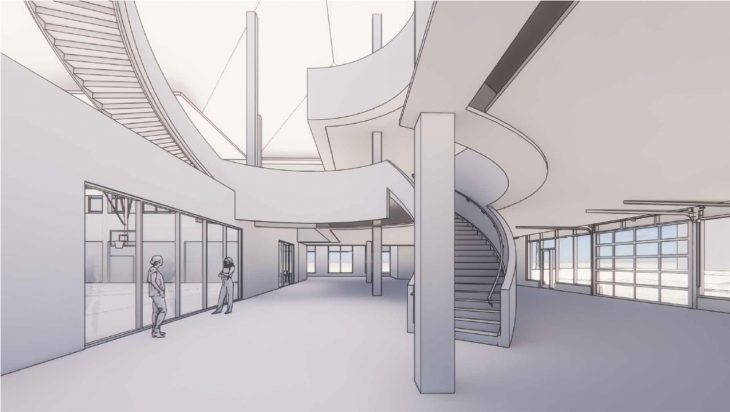
“We are actively engaged in a fundraising campaign to support the HealthEU Center in partnership with inspired donors who believe in the vision for the center and are committed to ensuring students have the skills they need to lead lives of meaning and purpose,” Piatt said.
The plans for the facility follow years of work at Elon including the 2016 report by the Presidential Task Force on Social Climate and Out-of-Class Engagement as well as the 2018 report by the Task Force on Student Wellness and Well-Being. The university appointed a group tasked with creating a vision for a new center on campus, and in 2022, the university launched the HealthEU initiative that is guided by the HealthEU Council and the new director of HealthEU iniatitives, Anu Räisänen, who starts at Elon in August.
Brad Moore, associate vice president for facilities and chief facilities officer, said the task force creating the vision for the new facility completed multiple visits to other university facilities. The visits included new buildings and renovated buildings, and while some tried to integrate multiple components into the facility, none went as far as what Elon was seeking to do, Moore said.
“What we found was that no one was doing exactly what we were planning on doing which was not only the practice of health and well-being, but the research and study and education around wellness and well-being,” Moore said.
Jon Dooley, vice president for student life, said many of the facilities on other college campuses are very student-focused, and Elon wanted to take a more expansive approach. “In our case, we’re thinking about this as a community of well-being that is supported by this facility,” Dooley said. “The goal is for this to be a resource to the entire university community — students, faculty and staff.”
Elon has been intentional with the design by fully integrating academic components into the facility to underscore the emphasis on collaboration and to help leverage the spaces within the facility for research purposes. Provost and Vice President for Academic Affairs Rebecca Kohn explains that the building was designed so that users move through different types of spaces on their way to their destination. For instance, the classrooms will be interspersed throughout the three floors of the building rather than placing them all in one area.
“There’s exercise equipment spread throughout the building,” Kohn said. “Faculty offices won’t necessarily be next to classrooms, and faculty and staff offices related to health and wellness will be intermixed.”
For instance, a person heading to the third floor for a financial literacy class may pass the gym, the offices for counseling services and an exercise science lab. The goal is to help people see the connection between these different elements and how they impact a person’s overall wellness and well-being.
“We’d like this to be a space that draws all faculty, staff and students into it so that everyone can see something about this building that they want and need to be part of,” Kohn said.
Construction of the HealthEU Center will begin in the fall, with Samet Corp. serving as construction manager. Plans call for the building to open in 2026.



